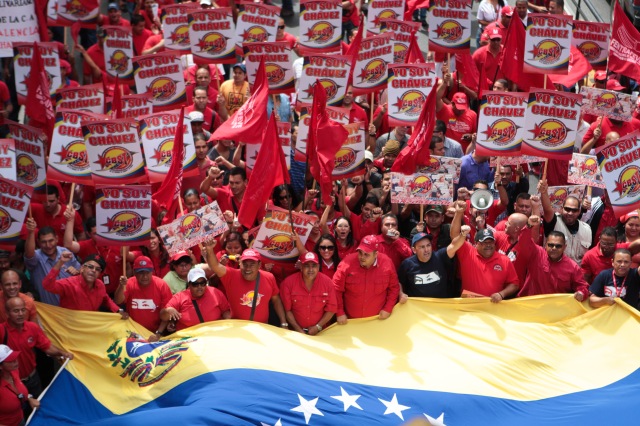They're not weird, we're weird
 Mulling yesterday’s dreamlike i-non-guration and meditating over how far gone the republic now seems, one thought keeps haunting me: it’s not their values that are weird, it’s our values that are weird – Western, Educated, Industrialized, Rich and Democratic.
Mulling yesterday’s dreamlike i-non-guration and meditating over how far gone the republic now seems, one thought keeps haunting me: it’s not their values that are weird, it’s our values that are weird – Western, Educated, Industrialized, Rich and Democratic.
It’s a painful realization, but we we can’t help but circle back to again and again: the value-system that was outraged by chavismo’s power grab this week is miles and miles from home on the Northern Fringe of South America.
Specifically, our horrified rejection of the accumulation of unlimited power in a single set of hands is a core value for Western liberalism…it happens to make no sense to most Venezuelans.
The rejection of unified power is, when you think about it, the ultimate WEIRD value. In the Western world it’s universal, though it takes very different forms. In the U.S., lefties fret about Wall Street amassing too much power, civil libertarians fret about the Pentagon’s drone strike program giving it too much power, the right frets about the government in general getting too much power by taking people’s guns away or taxing them to oblivion.
How you interpret what “too much power” means and who you think should be prevented from accumulating it is very much under dispute – a dispute often at the heart of WEIRD politics. But the general, diffuse belief that it’s dangerous to your freedom to allow too much power to accumulate in a single set of hands is a meta-narrative woven through the polity, silently holding it together.
In the WEIRD consensus, the more power the state has, the less power I have. And the Venezuelan opposition’s mindset is squarely within this WEIRD consensus. But the reality – painful and maddening though it is – is that most Venezuelans aren’t weird. If #YoSoyChavez, then the more power the state has, the more power I have.
That’s why so many people find our particular obsession with legal mechanisms to prevent one faction from accumulating too much power bizarre and off-putting. To the broad middle of the Venezuelan electorate, Supreme Tribunal Magistrate Luisa Estela Morales is speaking plain common sense when she says “the division of powers weakens the state.”
People don’t want a weak state. People want a strong state that’s on their side. People believe that the state, one day, will come through for them: a deus ex machina solution to all their problems. Our perverse little obsession with tangling it up in red-tape looks to them, to the (very limited) extent that they think about it at all, like a mean-spirited attempt to hobble it for our purposes.
For that broad center of the Venezuelan electorate that votes for Chávez, we’re basically obsessing about about a non-problem, and proving our irrelevance in the process. The reason why you virtually never see chavismo engage in serious debate over the hollowing out of the constitution’s checks and balances is the same reason you never see the opposition earnestly debate the problem of CIA sabotage of the electrical system. We think it’s non-sense: a non-problem talked up by our enemies to score cheap political points. It makes no sense to us, so we discount it.
And that’s exactly how they react, and will continue to react, when we note the way they blatantly flout the constitution to accumulate more and more power.
As an aside, in Samuel Huntington’s last good book before he became a ranting reactionary, he had a really enlightening riff on all this. For Huntington -and this is from memory, so caveat lector– the problem of limiting power only arises where states are powerful enough to be a threat. But Huntington locates those mostly in the WEIRD countries, and notes that most states in the rest of the world have the opposite problem.
Writing in the 1960s, Huntington argued that, as new groups are mobilized into politics, the state often struggles to keep up, to govern enough to meet the challenges of rapid urbanization and the political empowerment of new groups.
In such contexts, the overall problem is that there’s not enough state power to go around society, not that there’s too much that needs reigning in. He saw this – rather than any of the entelechies arising from Marxist theory – as the real reason communist politics were so attractive in so many developing countries: communism set out specifically to solve the problem of not-enough-power-to-meet-societies-needs, whereas liberals senselessly set out to place limits the power of states that already didn’t have enough.
I’m not doing his argument justice here. But it’s a gorgeous read.
Caracas Chronicles is 100% reader-supported.
We’ve been able to hang on for 22 years in one of the craziest media landscapes in the world. We’ve seen different media outlets in Venezuela (and abroad) closing shop, something we’re looking to avoid at all costs. Your collaboration goes a long way in helping us weather the storm.
Donate




